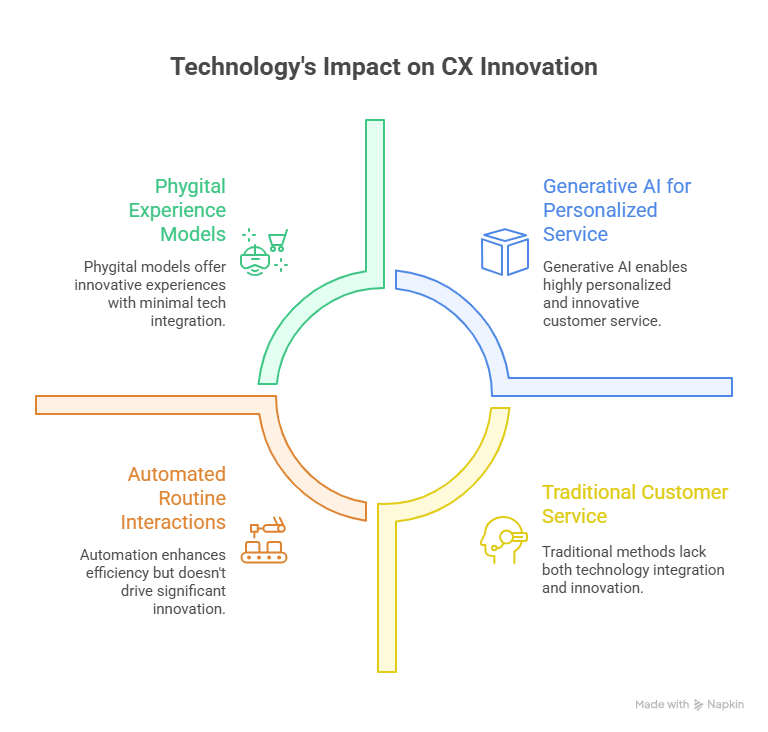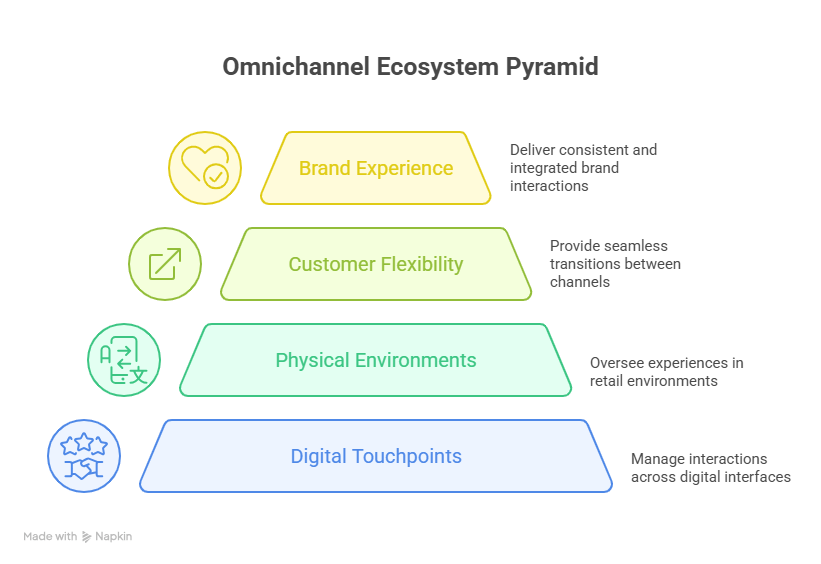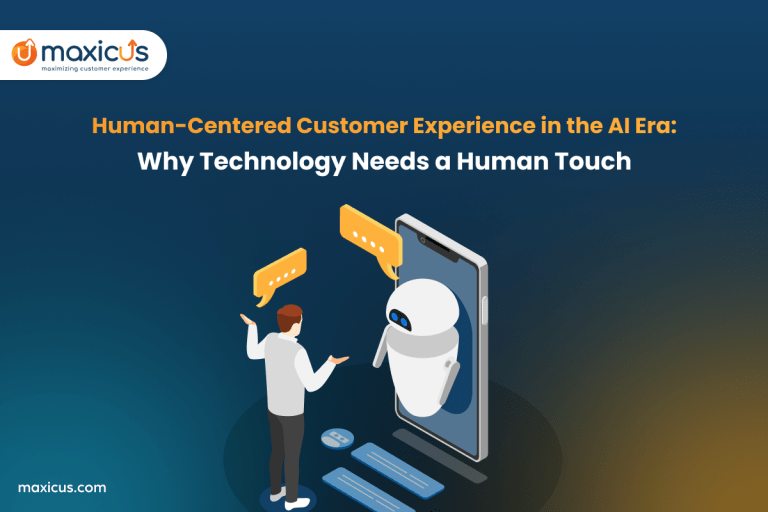How Global Capability Centers (GCCs) Are Evolving into CX Innovation Hubs
By 2025, India is expected to host more than 1,700 Global Capability Centers (GCCs), employing around 1.9 million professionals and generating over USD 64.6 billion in revenue. With a projected annual growth rate of 8% through 2030, India has firmly positioned itself as the global epicenter for GCC expansion, digital transformation, and customer experience (CX) innovation. As enterprises accelerate their focus on AI, automation, and omnichannel strategies, GCCs are emerging as strategic hubs that drive end-to-end customer engagement excellence across global markets.
This blog explores how India’s GCC ecosystem is evolving from operational support units into high-impact CX innovation centers, and why the combination of technology, talent, and human-centric thinking is redefining the future of customer experience.
The Evolution of GCCs: From Cost Centers to CX Innovation Hubs
Traditionally, GCCs were viewed as offshore cost centers focused on back-office functions, operational efficiency, and administrative support. However, over the past decade, their role has transformed significantly. Today, GCCs actively influence global CX strategies, lead digital transformation programs, and drive innovation across customer engagement models.
Indian GCCs are projected to grow from USD 64 billion in FY2024 to nearly USD 105 billion by 2030. This rapid expansion indicates a shift in enterprise expectations from pure cost optimisation to value creation. Mature GCCs now play a decisive role in shaping product experiences, customer journeys, and technology roadmaps. Yet only 8% of GCCs have reached a maturity level where they actively influence global innovation outcomes, highlighting substantial potential for further advancement.
The most progressive GCCs are integrating technologies such as generative AI, predictive analytics, automation tools, and omnichannel platforms. These investments enable them to move from reactive support functions to proactive experience creators that deliver measurable business impact.
Discover more insights on GCCs
Key Drivers Behind GCC Transformation
Several core trends are driving the acceleration of GCCs as customer experience innovation hubs. One of the biggest catalysts is the increasing enterprise focus on agility and rapid skill development. Companies are investing heavily in training programs that help employees quickly adapt to evolving customer needs, new technologies, and shifting market dynamics.
The rise of digital-first and remote work models has also pushed GCCs into a central role. Post-pandemic business operations rely heavily on distributed support structures, and GCCs are now responsible for enabling seamless, secure, and efficient collaboration across global teams.
Strategic alignment is another critical driver. GCCs that operate with strong executive sponsorship are better positioned to secure long-term funding, experiment with new technologies, and maintain visibility at the enterprise level. This alignment ensures they evolve into innovation-led business units rather than transactional support teams.
Finally, multi-hub strategies have become increasingly common. Enterprises are establishing GCCs across various geographies to improve resilience, access diverse talent pools, and streamline global service delivery while ensuring continuity and scalability.
The Role of Technology in Shaping CX Innovation

Technology is the foundation upon which modern GCCs are building next-generation customer experiences. Generative AI and automation are at the forefront of this evolution. These technologies enable GCCs to automate routine interactions, enhance service quality, reduce operational load, and provide deeper personalization across customer touchpoints.
Omnichannel engagement platforms play an equally important role. Customers today expect a unified experience across chat, voice, email, social media, and video commerce. GCCs are integrating these channels to ensure consistency, eliminate service gaps, and deliver contextual, real-time engagement.
Phygital experience models, which bring together physical and digital interaction points, are also transforming how brands interact with consumers. Whether through virtual product demonstrations, remote consultations, or hybrid service models, phygital engagement is becoming an essential part of customer experience design.
Data and analytics further strengthen this ecosystem. With the global data analytics market expected to surpass USD 1.2 trillion by 2034, GCCs are leveraging real-time insights to anticipate customer needs, reduce friction, and design superior interaction journeys. This data-driven approach supports continuous improvement and better decision-making across CX operations.
Human-Centric Customer Engagement at the Core of GCCs
Despite rapid technological advancements, human-led interaction remains central to effective CX. GCCs understand that empathy, communication skills, and problem-solving capabilities are irreplaceable in complex scenarios. As a result, leading GCCs invest heavily in employee development, focusing on both technical and behavioural competencies.
Human-centric engagement becomes especially valuable during situations that require emotional intelligence, such as escalations, high-value transactions, or personalised consultations. Video commerce and live support channels further reinforce the importance of human involvement, allowing customers to feel supported, understood, and valued.
By combining human judgment with AI-powered systems, GCCs can provide interactions that are efficient, thoughtful, and aligned with customer expectations.
The Phygital and Omnichannel Imperative

Customers today expect seamless transitions between digital and physical channels. Whether they begin an interaction on a website, continue it on a mobile app, and complete it through a phone call or an in-store visit, the experience must be consistent and integrated.
GCCs play a central role in enabling this omnichannel ecosystem. They manage key touchpoints across digital interfaces, retail environments, contact centers, and self-service platforms. By bringing phygital and omnichannel strategies together, GCCs offer customers the flexibility and continuity they seek while helping enterprises deliver stronger brand experiences.
Maxicus and the Next Wave of CX Innovation
Maxicus is helping organisations shape the next generation of customer experience through a combination of advanced technology, deep industry expertise, and human-led service excellence. The company enables GCCs to adopt scalable omnichannel frameworks that unify customer touchpoints, ensuring consistent, real-time engagement.
Through the integration of generative AI, analytics-driven decisioning, and phygital engagement models, Maxicus empowers businesses to reduce operational costs, improve customer satisfaction scores, and enhance customer lifetime value. With a strong focus on personalised, high-impact interactions, Maxicus strengthens GCC capabilities across industries and supports enterprises in delivering measurable CX outcomes.
Ready to build a future-ready CX model?
Conclusion
India’s GCCs have evolved into strategic engines of customer experience innovation. By embracing technology, omnichannel infrastructure, data-driven insights, and human-centric engagement, they are redefining how global organisations approach CX transformation. As enterprises navigate increasing expectations and digital disruption, GCCs equipped with advanced capabilities and strong partners like Maxicus will play an indispensable role in shaping future customer journeys.
To remain competitive, organisations must leverage the combined strengths of AI, automation, and skilled human talent. The future of CX lies in the seamless integration of technology and empathy, and India’s GCC ecosystem is uniquely positioned to lead this transformation.
Unlock the Full Potential of Your GCC
To learn how Maxicus can help elevate your GCC’s CX innovation journey, streamline operations, and deliver exceptional customer engagement, contact us today for a customised consultation.
FAQ
1. What is a Global Capability Center (GCC)?
A Global Capability Center (GCC) is an offshore unit set up by enterprises to handle critical business functions such as technology, operations, and customer experience. GCCs act as strategic hubs for innovation, digital transformation, and global service delivery.
2. How are GCCs transforming customer experience (CX)?
GCCs transform customer experience by using AI, automation, data analytics, and omnichannel platforms to improve service quality, reduce response time, and deliver highly personalized customer journeys.
3. Why is India a leading hub for GCCs?
India leads the GCC market due to its large skilled talent pool, strong digital infrastructure, competitive costs, and high adoption of emerging technologies, making it the preferred destination for global enterprises.
4. What technologies are driving the growth of GCCs?
Technologies driving GCC growth include generative AI, machine learning, automation, cloud platforms, data analytics, and omnichannel engagement tools. These technologies help GCCs scale operations and improve customer experience.
5. What is the role of GCCs in digital transformation?
GCCs play a central role in digital transformation by building modern tech capabilities, automating processes, integrating customer channels, and developing scalable digital solutions that support global business operations.










